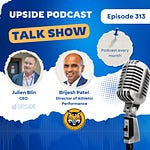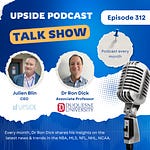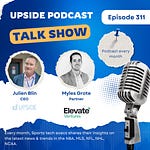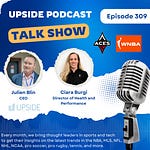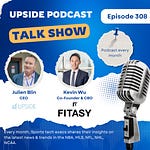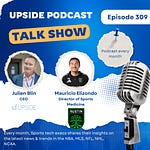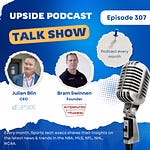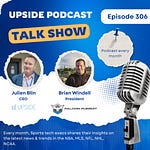Upside Accelerator profile of the month:
VC name: Techstars Sports Accelerator
Headquartered: Indianapolis (Indiana)
Founded: 2019
Managing Partners: Jordan Fliegel (Managing Director), Andrew Hippert (Investment Principal), Elliott Mack (Investment Associate).
Website: https://www.techstars.com/accelerators/indy-sports
Sectors: Sports, Entertainment & Fitness
VC type: Accelerator, Venture Capital
Acceleration duration: 13 weeks
Typical investment range: $120k
Total number of investments: 43 core investments to date
Total number of exits: 0
Source: Techstars Sport Accelerator
The Techstars Sports Accelerator has a key focus on innovation with goals to foster early identification of key trends for future technology in sport; meaningful engagement with early-stage sports tech companies; embrace technologies and business models that will impact the sports industry; and enhance a culture of internal innovation and the spirit of entrepreneurship.
Techstars’ founding partners include Pacers Sports & Entertainment, NextLevel Indiana, 50 South Capital, NCAA and Indiana Sports Corp. Techstars’ supporting partners also include Indycar, Indianapolis Motor Speedway and the Indianapolis Colts.
Here is the link below to apply to the Techstars Sports Accelerator program:
This week, we interviewed Andrew Hippert, Investment Principal at Techstars Sports Accelerator & Techstars NYC to discuss his background, investment thesis, his accelerator, his area of focus, and what he is typically looking for when investing in startups. He also gave us his advice to raise money and to start a career in sports investment.
Best Quotes: Here’s some of the key discussion points and best quotes from our conversation with Andrew:
On his background:
“I grew up outside of Boston, Massachusetts. My whole life has really revolved around sports. My father was a coach. He coached basketball, baseball, football, and is currently coaching tennis. He's in his eighties.”
“I grew up playing a lot of basketball. I played in high school and I was fortunate enough to be able to play in college at a small school up in Maine, Bowden College where I was captain of the basketball team. After college, I bounced around a little bit, and got into coaching.”
“I coached at the high school level and I also coached at the collegiate level, at Babson College. I also spent some time coaching at Catholic University in Washington, DC. I spent time working in professional sports with the Orlando Magic (NBA) coming out of grad school where I earned my MBA and Masters in Sports Business Management, and then with Monumental Sports & Entertainment, the holding company that owns the Washington Wizards and Washington Capitals.”
On how he got into entrepreneurship and the startup world:
“In between my stints in college and professional sports, I had a chance to work for a startup. I fell in love with the environment of working in a fast-paced environment and being involved with other entrepreneurs, building companies, and iterating on product.”
“I had two of my best friends from childhood that were both successful entrepreneurs. And so I'd always talk to them about their businesses and the different challenges that they were facing, and generally, how exciting it was, as they were both building companies in the sports technology category.”
On how he ended up joining Techstars Sports Accelerator:
“When I had the chance to leave college sports to spin up the Techstars Sports Accelerator in Indianapolis, it felt like a no-brainer for me. It combined the experience and the knowledge that I had on the other end of the table working for professional teams and in college athletics, as both a player and a coach, just trying to offer that perspective to the next generation of entrepreneurs who are building products and services that we're trying to sell into those particular teams and leagues. So it's been a lot of fun for me”.
“I really enjoy it. I get to work with with Jordan Fliegel, one of my best friends who's also my business partner. Jordan and I also played basketball together in college (..) we love what we do and we love supporting and helping entrepreneurs.”
On the Techstars Sports Accelerator program:
“Techstars is a global network that helps early stage entrepreneurs grow and scale their businesses. And they do it through three major buckets (…) There are over 50 Techstars accelerators worldwide.”
“We're in 35 cities, 14 different countries, and we are growing and growing exponentially across a variety of verticals. Of course we run the sports program, but we have a programs covering a range of fields such as blockchain, agTech, healthcare, proptech, social impact and many more ”.
“We're investors, so we invest capital in each of the companies that go through our accelerator. But I think our big value proposition to founders is that we're essentially an extension of the co-founding team on the cap table because we provide a lot of coaching, strategy, advice and guidance throughout the 13 week accelerator program.”
“Our partnership group came together in 2019 and Indianapolis, for those of you who are unfamiliar, it's an incredible sports town. It's arguably one of the best sports towns in the U.S. It's the home of basketball if anyone's seen the movie, Hoosiers. It's the home of the Indiana Pacers (NBA). It's also the home of collegiate athletics with the NCAA being headquartered here. The NCAA governs all intercollegiate sports here in the US. It’s also the home of sports tourism. I think there's a statistic that you can get to 60% of the country's population within a four or five hour drive just from where Indiana is strategically located. The state of Indiana through its Next Level Fund has also been incredibly supportive of our program.”
“The Indianapolis Colts (NFL) are also there. It's also a great racing town. For people who have never been to an IndyCar race, I highly recommend attending the Indy 500. It's the largest spectator event in North America. They get over 300,000 people here for that race”.
On their progress since 2019 as they are about to launch their 5th sports program:
“We came in 2019 and launched the first accelerator. We brought in 10 companies, and we've done four programs to date. We have over 43 companies in our portfolio. We're now moving into our fifth program, and we're actually almost at our demo day here in for New York City.”
On their Techstars program in New York City:
“In addition to the Techstars Sports program in Indianapolis, we've been tasked to run the Techstars NYC Accelerator program here in New York City which is category agnostic and focuses on everything not sports or fitness related. The team is lead by myself, Jordan and our partner Elliot. It is a three month program with different themes to each month. So we get companies that are early, who have demonstrated product-market-fit and help scale their businesses through our network and coaching”.
“Typically our companies have some customers that are paying, but they're really figuring out things such as: How does this thing get big? How do I scale this? How do I raise money? A lot of our founders haven't raised institutional capital. Maybe they raised money from some friends and family members, or from some angel investors”.
On what they teach to their entrepreneurs through their program leading up to pitch day:
“We are really teaching them the proper process to fundraise, exposing them to our network of VCs and syndicates and investors and angels. I think it's one of the biggest value props. So we get them in front of as many people as we can, and they practice their elevator pitch and they get feedback on their product, their go-to-market strategy, or on how they are acquiring customers.”
“And that segues nicely into our second month, which is really just about executing. We run 30 different workshops on SEO marketing and financial modeling, hiring a technical team, understanding cap tables, term sheet negotiation etc. And then the third month is all about getting ready for our pitch day, which is demo day, where we put our founders on stage, and they pitch in front of 300+ investors.”
“So our next New York City Demo Day is February 10, 2023. We're hosting it over at Google Pier 57 in New York, which is a stunning location. And then our sports program in Indianapolis will launch in early June, and we'll have our demo day in late August, early September”.
On what they are looking for when looking to invest in startups:
“I think the most important thing to us, Julien, is really founder market fit. So when we say founder market fit, we say: What unique insight or particular set of experiences does this founder, CEO have that provides them or gives them an overwhelming advantage to build in this particular space?”
“One of the biggest qualities that what we look for is the background of the founding team. So one of the things we really look for and spend a lot of time analyzing during our diligence and sourcing process with companies is: Who's the founding team? What's the background of the founding team? How do they operate? How do they work together? How do they divide and conquer? Is there someone that can sell? Is there someone that can build?“
“Because a lot of times you only have a couple co-founders who both have sales backgrounds. We're both selling the product, but there's no one that's actually building the technology. Or you have a couple of engineers. They are really good at building the product and developing the tech stack, but they can't sell. So trying to find the right balance in the founding team is really, really important for us.”
“Coachability is also integral for us as we spend a lot of time with founders both in the program and post program, on really trying to teach them how to run a fundraising process, teach them how to hire, teach them how to think about running their KPIs or their OKRs. We are really teaching them how to become CEOs because in a lot of ways we want them to run their business like it's a fortune 500 company”.
“And of course, we are looking at the market, the category, or the space. That's very important. Is the addressable market big enough? Is the problem that you're solving a real problem, and what is the solution? What's the unique competitive advantage that your solution has? Those are things that we're looking for at this stage because when you're raising your seed round it's really all about storytelling. It's all about the strength of the founding team. It's about the pitch deck, the financial model, and if your assumptions make sense”.
On his advice to any startups looking to raise money:
“We tell our founders: If you don't like fundraising, you shouldn't be the CEO because you're always fundraising. There are three things that you need to do as a CEO and that you can't outsource. It's fundraising, it's hiring and it's setting the strategic vision for the company”.
“I think making sure that you're really getting the right investors on your cap table is important. We've seen so many times where founders will bring the wrong people in and they'll just want to take the first check that's thrown at them (...) But I would almost put the onus on the founder. So when you're having conversations with investors, you're diligencing them too”.
“It's really important to get a sense of, okay, what's your check size? What's your thesis? What do you look at? How many board seats do you like to take? How hands-on are you? Because it's really important when you're bringing people into your circle as investors. It's what's the value add outside of just the check. There are plenty of VCs that can throw checks at you but there's strategic value that person can offer inside and that that person can offer. That can help you continue to build the company”.
“For founders raising right now, I would tell them to focus on building a good product and listening to your customers. And when you're talking to VCs, it's not just about institutional VCs, there are syndicates, angel investors, family offices, or even venture debt out there”.
“There's a lot of dry powder. Deals are still getting done. I will say though, I would caution founders to be patient during the diligence process because we've seen that become very extended. So last year a deal would maybe take three or four weeks to get done. It is taking closer to six to eight weeks now to get it done. So I think patience is a virtue as they say”.
On the pressure for startups to raise VC money but it does not necessarily have to be:
“I would say this too. Not every company needs to raise money. I think some founders feel the pressure of being in the VC game where they feel like they need to raise money. I think there's this stat where it's something like 80% of businesses sell between $30M to $70M or something like that.”
“So that's life changing money for a lot of founders, but you don't have to be the next unicorn company. We have a lot of companies in our cohort now that will go through the program and they won't raise money. In fact they're: Hey, we're pretty comfortable bootstrapping the business. We're really heads down on building our product. We really want to get to market. We want to refine what our value proposition is. We wan to acquire more customers. So you don't have to raise money. You can find a lot of ways to be capital efficient”.
On his advice to anyone interested in starting a career in sports investments:
“I think getting experience in the space, whether it's selling tickets, whether it's working in digital marketing for a professional sports team or a college athletic program, or with a brand or an agency is key. I think really just understanding the landscape is very important. The sports investing world is a lot smaller maybe than what people think it is.
“Over the last three and a half years or so of doing this, I think we've really met most of if not all the power players here in sports venture capital. So it is a smaller world than what you think it is. But it can be a tough nut to crack”.
“So my advice would be get some experience in sports in whatever sort of capacity that is. I think having experience on the operating side is really helpful. It's so helpful to get the experience of being on the other side of that table. When I started at Techstars in 2019 with the sports program, I spent a lot of time working with our B2B companies that were selling products or services into sports teams and leagues, college athletic departments because that's where my background was”.
“Because I said: Hey, look, I've worked on that end of the table. I understand how they look at new technologies. I understand the politics of how decisions are made and how deals get done. And so maybe there's some insights that I can share with you on how to better prepare you and how to better articluate your pitch”.
“I also highly recommend if you are a young person graduating from college and you wan to work in sports venture capital, that you spend a couple of years working at a startup. I think that a lot of the best investors are former operators because they understand how hard it is to build a business, and what to look for in successful founders. So my advice would be to get some experience building. That will only make you a better investor”.
You may also like:
Upside chat: Isaiah Kacyvenski (Will Ventures)
Upside Chat: Vasu Kulkarni, Partner (Courtside Ventures)
Upside Chat: Kai Bond, Partner, (Courtside Ventures)
Upside VC Profile: Stadia Ventures






